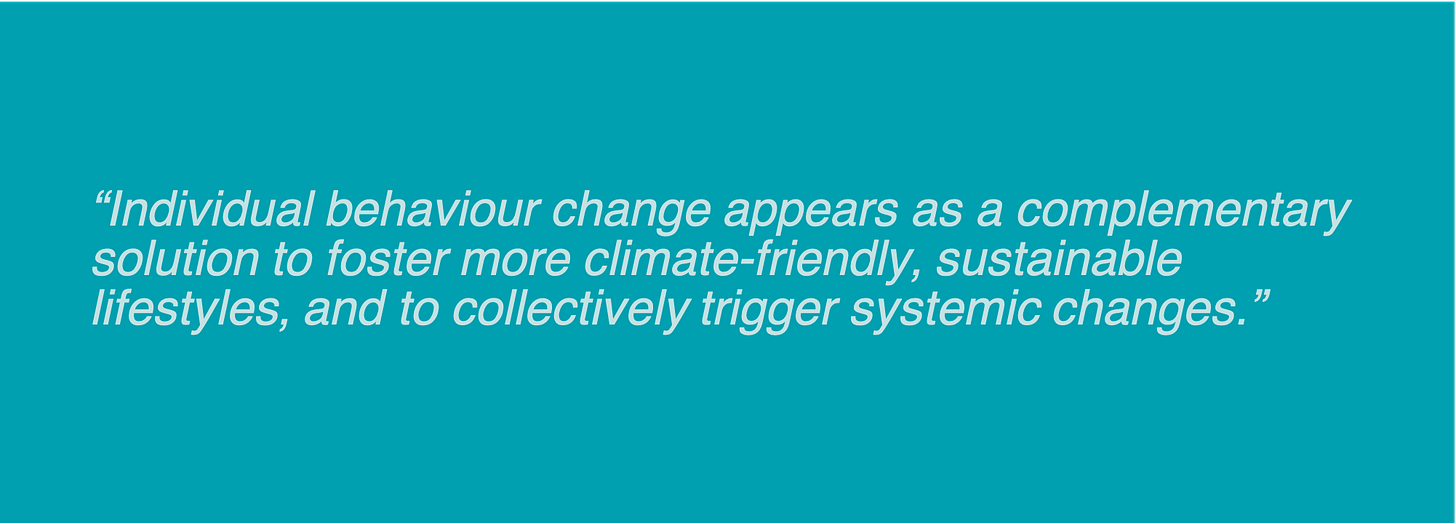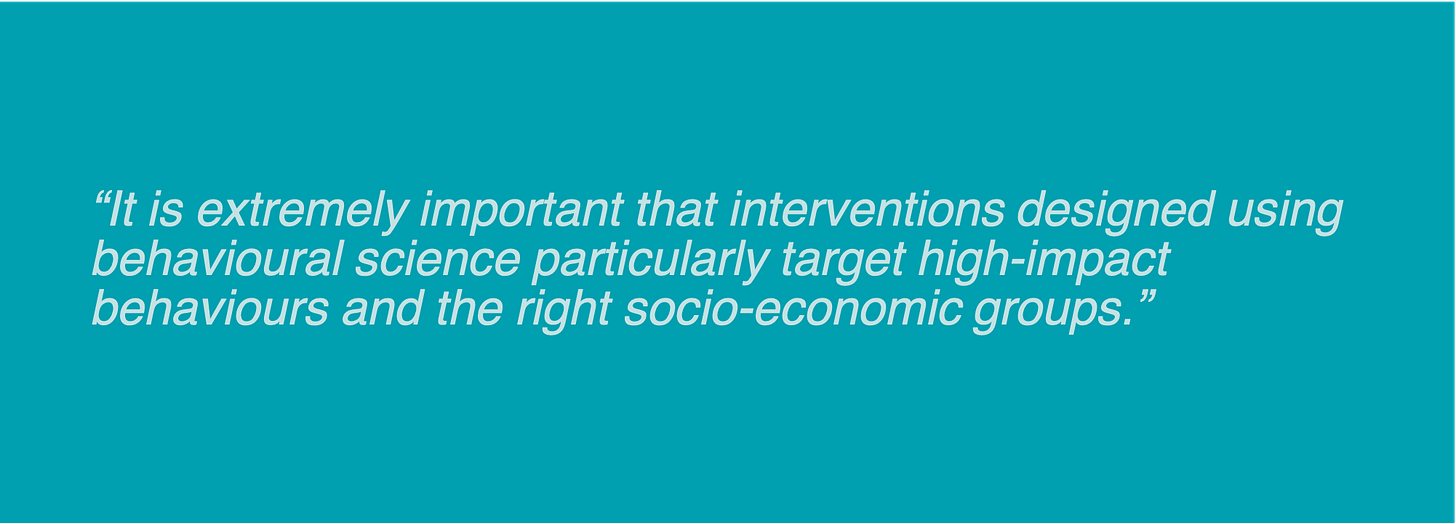COP26 - Key Messages on Behaviour Change
In a previous article, Stuart Capstick insisted on the importance of encouraging individual behaviour change to tackle the climate crisis. The recent COP26 presented several discussions around the topic of behaviour change, and this article sums up the key takeaways on why behaviour change should be a part of the conversation concerning the climate crisis and the role of behavioural science in this regard.
Essential to a sustainable future
Following the outcomes of COP26, many have voiced their disappointment with global leaders and governments for not keeping track of the 1.5°C targets that would help prevent further devastating consequences from climate change. For many, individual behaviour change appears as a complementary solution to foster more climate-friendly, sustainable lifestyles, and to collectively trigger systemic changes.
Climate scientists have been doing a tremendous job at presenting the environmental issues we face today as a species. The causes, consequences and the steps we must take in order to tackle the climate and environmental crisis. However, at the global level, knowledge has not been translated into action, partly due to the difficulty of changing human behaviour. It, therefore, seems like a challenge that behavioural science could help tackle.
Key numbers
The following research presented at COP26 highlights the importance of individual behaviour change:
The 2019 Climate Change Committee report suggests that over 60% of emissions reduction rely on individual behaviour change.
More importantly, two-thirds of global emissions are connected to households’ consumption, with 1% of the richest households (80 million) emitting more than twice as much emissions as the poorest 50% (3.9 billion).
On a daily basis, 20% of our lifestyle emissions can be attributed to sectors such as mobility and food consumption. Some of the key points discussed in the context of these two sectors are outlined below:
Mobility
Martin Dean, Managing Director at the Go-Ahead Group, urged national and local governments to encourage people to adopt greener means of transport: “I think one of the challenges of the transport decarbonisation plan is that there’s a soft implication that everything can be achieved through technology. But I think we all know that there needs to be some behavioural change as well.”
An idea that was re-emphasized by Patrick Harvie, MSP at the Scottish Government: “If electric vehicles are our only focus, then we’ll have missed out on an opportunity for really profound changes to the way we move about and to improve the wealth of people and the planet”.
Food
Food waste was another issue discussed during COP26. Globally, 1.3 billion tons of food is wasted annually, amounting to a third of all food produced for human consumption. At the same time, 1 in 9 people is going hungry across the world. Food waste currently accounts for 8-10% of global greenhouse gases.
With 66% of the total amount of food waste occurring at home, there are many opportunities for civil society actors to intervene in that space, not only by increasing knowledge of the impacts of food waste but also by offering practical solutions that could make it easier for individuals to reduce their waste.
Mark Given, Chief Marketing Officer at Sainsbury’s, also reminded that the wider consumption of plant-based food would be highly beneficial for the environment: “A diet that is better for us is a diet that is better for the planet”. And, as discussed recently in Good Moves, behavioural science offers many opportunities to facilitate the adoption of those diets.
Targeting the right groups
Behavioural science holds a wealth of knowledge that could help address challenges across various sectors such as food and mobility. However, it is extremely important that interventions designed using behavioural science particularly target high-impact behaviours and the right socio-economic groups. In relation to designing the right behavioural interventions, Polaris Koi from the University of Turku takes the example of nudging and states: “It is of paramount importance that a nudge includes an accurate and comprehensive analysis of the climate impacts; that we target the most effective behaviours, rather than tinkering with something insignificant”, and adding “since harms from climate change are unevenly distributed, disproportionately affecting the global poor, inefficiency would make us complicit in those injustices and we need any intervention to be designed with that in mind.”
Incorporating behavioural science into policy
Practically speaking, behavioural interventions need to be “specific, powerful, actionable, complete and encouraging”, according to Dr Kai Ruggeri, a researcher at Columbia University, who suggested incorporating them into policymaking. In the same line, Lewis Akenji Director of the Hot or Cool Institute, added: “Even in countries with high awareness and pro-sustainable attitudes, a high carbon footprint is observed. This gap needs to be bridged by facilitating these attitudes through the right policies, laws and administration.”
Key takeaways
In sum, here are three takeaways from COP26 concerning behaviour change:
Technological progress needs to be coupled with individual behaviour change and acceptance in order to accelerate change.
Governments and organisations have a role to play in facilitating the adoption of sustainable behaviours, and that’s where behavioural science comes into play.
Citizens and consumers have the power to create ripple effects and, ultimately drive forward large-scale systemic changes towards more climate-friendly societies.
In the words of Prof Katherine Hayhoe, Chief Scientist at the Nature Conservancy: “When it comes to climate action, we need systemic solutions. But how do those solutions happen? When individuals use their voice and their actions to catalyse change. That’s the only way our industrialised society has ever changed in the past. That’s the way it can change again and that’s the way it must change again…”.
Capstick, S., Khosla, R., Wang, S., et al. (2020). Bridging the Gap–the Role of Equitable Low-carbon Lifestyles. UNEP Emissions Gap Report 2020. UNEP: Nairobi. PDF
Worldwide food waste: https://www.unep.org/thinkeatsave/get-informed/worldwide-food-waste
Food waste: alarming rise will see 66 tonnes thrown away every second: https://www.theguardian.com/global-development/2018/aug/20/food-waste-alarming-rise-will-see-66-tonnes-thrown-away-every-second
Behaviour change, public engagement and Net-Zero: https://www.theccc.org.uk/wp-content/uploads/2019/10/Behaviour-change-public-engagement-and-Net-Zero-Imperial-College-London.pdf






